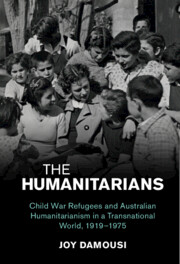 The Humanitarians
The Humanitarians Book contents
- The Humanitarians
- Studies in the Social and Cultural History of Modern Warfare
- The Humanitarians
- Copyright page
- Dedication
- Contents
- Acknowledgements
- Abbreviations
- Introduction
- Part I Saving
- Part II Evacuating
- 3 Humanitarianism and Child Refugee Sponsorship
- 4 Campaigns to Evacuate Jewish Child Refugees
- 5 British Child Evacuees to Australia
- 6 Aileen Fitzpatrick and Reuniting Greek Families Separated by War
- Part III Assimilating and Adopting
- Conclusion
- Select Bibliography
- Index
3 - Humanitarianism and Child Refugee Sponsorship
The Spanish Civil War and Esme Odgers
from Part II - Evacuating
Published online by Cambridge University Press: 28 July 2022
- The Humanitarians
- Studies in the Social and Cultural History of Modern Warfare
- The Humanitarians
- Copyright page
- Dedication
- Contents
- Acknowledgements
- Abbreviations
- Introduction
- Part I Saving
- Part II Evacuating
- 3 Humanitarianism and Child Refugee Sponsorship
- 4 Campaigns to Evacuate Jewish Child Refugees
- 5 British Child Evacuees to Australia
- 6 Aileen Fitzpatrick and Reuniting Greek Families Separated by War
- Part III Assimilating and Adopting
- Conclusion
- Select Bibliography
- Index
Summary
Chapter 3 explores the humanitarian work of the Australian communist Esme Odgers during the Spanish Civil War. Odgers’s story highlights the child sponsorship programme as a humanitarian technique through PLAN, which has yet to be fully discussed within the history of Spanish humanitarian aid. Odgers’s detailed letters written during the war offer unique insights into the material, social and psychological conditions under which humanitarian workers laboured, suggesting that humanitarian work was a multifaceted and unpredictable experience. An examination of this dimension allows for an exploration of emotions that humanitarian workers are expected to repress, and where the expression of individual emotions in the context of life and death is perceived as an indulgence. Further, a study of Odgers’s humanitarian efforts during the Spanish Civil War sheds light on the impact of these endeavours beyond Europe, extending our understanding of the global impact of the war. Odgers’s letters also reveal the trauma associated with dealing with the evacuation of children and reflects the psychological consequences of humanitarian work.
- Type
- Chapter
- Information
- The HumanitariansChild War Refugees and Australian Humanitarianism in a Transnational World, 1919–1975, pp. 85 - 107Publisher: Cambridge University PressPrint publication year: 2022
